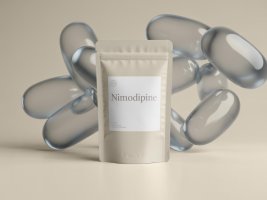
Nimodipine
Nimodipine is a type of medication known as a calcium channel blocker, primarily used in specific medical situations for several decades. It works mainly by influencing calcium channels in your cells, which is thought to protect brain cells and affect blood vessel function, and it's most recognized for improving outcomes after a specific type of brain hemorrhage called aneurysmal subarachnoid hemorrhage (aSAH). Studies strongly support its use in reducing poor outcomes like death or vegetative state after aSAH, with ongoing research exploring its potential in other areas like nerve recovery and cognitive function.
Table of Contents
Categories & Effectiveness
Brain Health
Excitotoxicity Defense
7/10Strong evidence of effectiveness
Neuro-Repair Support
7/10Strong evidence of effectiveness
Brain Circulation Boost
4/10Moderate evidence of effectiveness
Cognition
Memory & Recall
4/10Moderate evidence of effectiveness
Mental Acuity
4/10Moderate evidence of effectiveness
Working Memory
4/10Moderate evidence of effectiveness
Systemic Health
Cellular Repair
7/10Strong evidence of effectiveness
Vascular Health
7/10Strong evidence of effectiveness
Dosage & Side Effects
Recommended Dosage
Potential Side Effects
Bioavailability & Half-Life
Interactions & Stacks
Benefits by Use Case
Aneurysmal Subarachnoid Hemorrhage (aSAH) Recovery
Reduces the risk of poor neurological outcomes like death or vegetative state after aSAH. Primarily a medical intervention, not for general cognitive enhancement.
Nerve Injury Recovery
Increases the odds of functional recovery after facial nerve or recurrent laryngeal nerve (vocal fold) injury. Requires medical diagnosis and prescription.
Vascular Dementia Support
May improve cognitive scores (MMSE, CDR) when combined with donepezil in patients with vascular dementia, particularly after 12 weeks. Evidence quality varies, requires medical guidance.
Post-Stroke Memory
Showed potential to improve memory scores (FOME) in patients when given for 3 months starting 7-14 days after cerebral infarction. Needs confirmation in larger trials.
Working Memory Efficiency
A single dose decreased brain activity needed for a working memory task (N-back) without affecting performance, suggesting improved efficiency, especially in certain genetic profiles. Effect observed in a controlled study, not indicative of general use.




